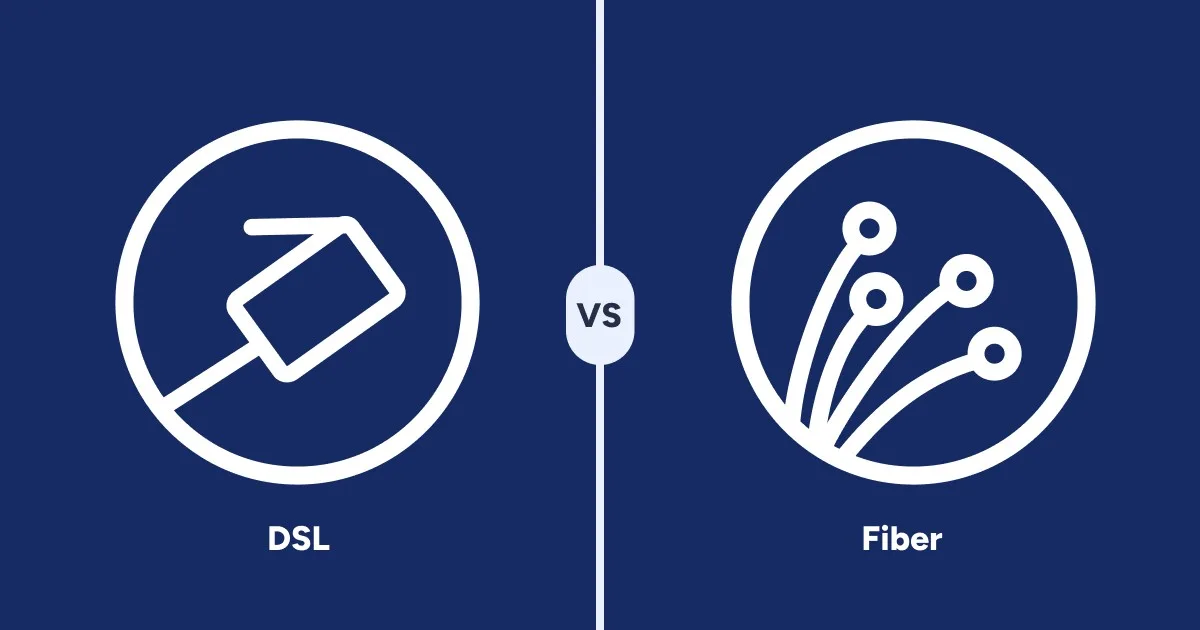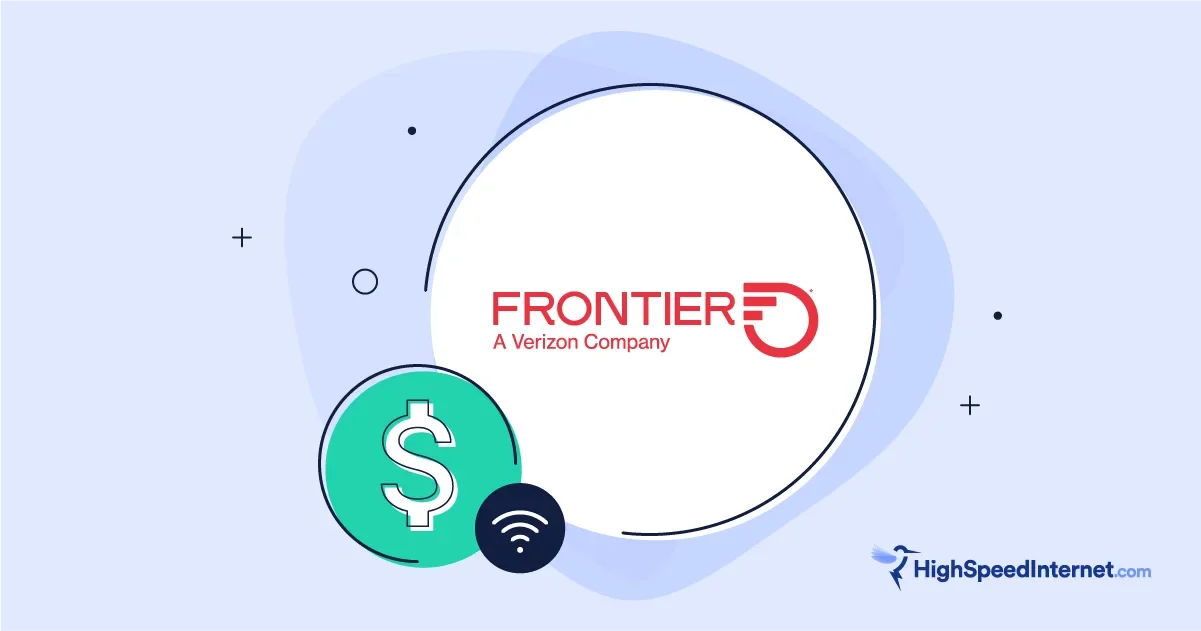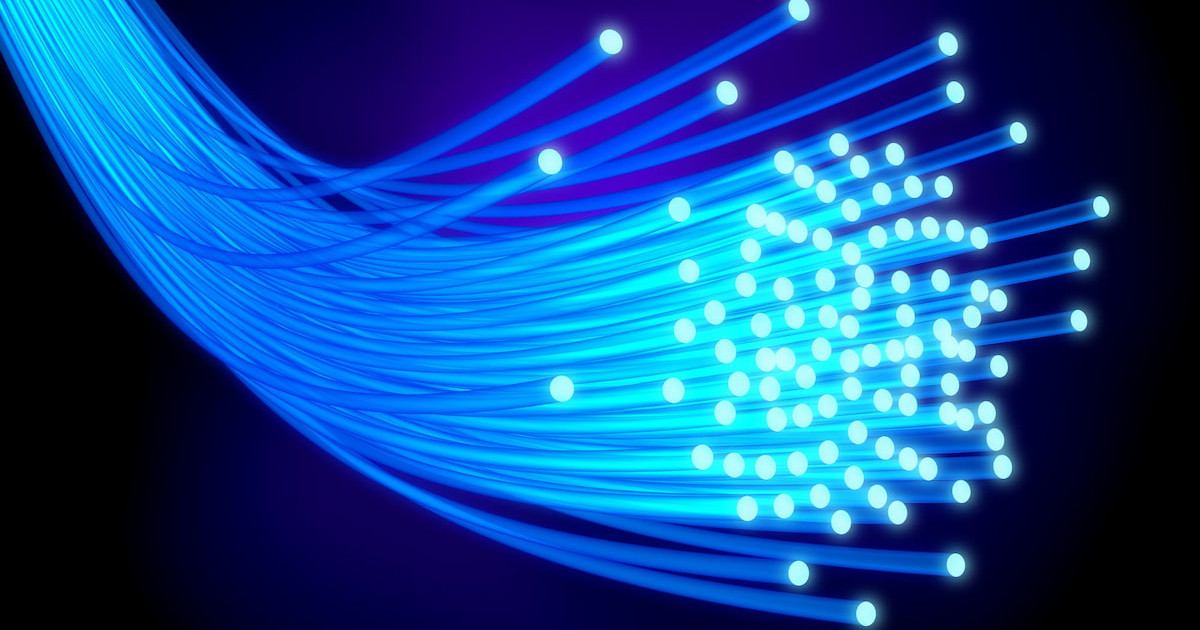Mbps vs. Gbps: Do You Need Gigabit Internet?
A gigabit internet connection might be just what you want, or might be more than what you need
Feb 24, 2026 | Share
FAQ, Gaming, Internet Speed Guides
Internet providers would simply love for you to sign up for their fastest plan available. But let’s get real here, folks: You don’t need Gigabit internet if all you do is check email and post pictures of your latest culinary efforts on social media. Heck, you definitely don’t need it in a household of five. Gigabit internet and faster is best for running a public web server, transferring large files to and from a remote network, or livestreaming gameplay to Twitch.
So, what’s the difference between megabits and gigabits? Is one internet speed faster than the other? We’ll break down the technical details as simply as possible so you can determine if you need gigabit internet speeds or a slower connection.
Is your current internet speed in the megabit or gigabit range?
Download speed
000 Mbps
Upload speed
000 Mbps
Latency (ping)
00 ms
Jitter
00 ms
Mbps vs. Gbps: What’s the difference?
The difference between megabits per second (Mbps) and gigabits per second (Gbps) is the number of bits you can send and receive each second.
In the days of dial-up, modem speeds were usually measured in kilobits per second (Kbps), like 28.8k and 56k. Modern-day broadband speeds are now measured in Mbps or Gbps. Here’s how the bits stack up:
- 1,000 bits = 1 kilobit
- 1,000 kilobits = 1 megabit (or 1 million bits)
- 1,000 megabits = 1 gigabit (or 1 billion bits)
Internet speed in Mbps or Gbps doesn’t mean data travels at specific speeds like cars zooming down a freeway—all data on the same type of connection travels at the same speed. Internet speed is more about the amount of data sent along the line in any given second. The higher the bit count per second, the faster you can download a file.
Look at it this way. Imagine your internet connection is a faucet, and your provider cranks down on the knob. The water (data) trickles in a thin stream (1Mbps) into your sink. When your sink finally fills, you swear an entire decade has passed. That’s your slow-as-snails internet connection.
Now your provider has turned up the knob, and your data flows like a waterfall (1,000Mbps). You’re using the same faucet, only the sink fills up faster with more water (data) going in, so you’ve only aged a few seconds versus ten long, agonizing years. That translates to a fast internet connection.
Get Your Internet Speed Recommendation
Est. time: 60 seconds
Answer 6 questions and get your personalized results!
How many people in your household use the internet/WiFi on a daily basis?
How many devices in your home connect to the internet, including tablets, gaming consoles, and smart devices?
How many people in your household work from home?
What video quality do you use for streaming TV and movies?
How intensely does your household participate in online gaming?
Does your household download large files from the cloud or via the internet?
Do you need gigabit internet speeds?
Your need for gigabit internet speeds squarely depends on what you do online and how many devices you have accessing the internet at one time.
For now, Gigabit internet is probably overkill for most homes because the chances of all five family members streaming Netflix in 4K to their devices simultaneously—which adds up to only 125Mbps anyway—is rare at best. You definitely don’t need Gigabit internet if all you do is check email and browse the internet.
If anything, Gigabit internet is nice to have if you need to download large files fast, like full digital games and their chunky updates. The type of internet connection matters, too, as livestreamers get more upload bandwidth using fiber than they do with cable internet.
Here are some online activities where you won’t notice much of a difference with Gigabit internet and some where you will.
| Works with slow internet | Best with fast internet |
|---|---|
Streaming video
Streaming high-resolution video is one of the most bandwidth-intensive things you can do online. If you have people streaming on multiple devices in your home, the speed requirements can add up fast. Take a look:
| Netflix (4K) | Apple TV+ (4K) | Hulu (4K) | |
|---|---|---|---|
| Bandwidth (one device) | 25Mbps | 25Mbps | 16Mbps |
| Bandwidth (four devices) | 100Mbps | 100Mbps | 64Mbps |
To help, video services like Netflix and Hulu have a lot of tricks for keeping your viewing experience smooth, such as preloading (buffering) video in the background and lowering the video quality if your connection can’t handle the load. But even Netflix can’t help much if too many people try to stream at the same time.
Theoretically, Gigabit internet has enough bandwidth for 20 people to stream 4K content at the same time—and use only half of the available bandwidth. This is why Gigabit internet is overkill for most homes until 8K content streaming becomes the norm.
If you want to know the nitty-gritty details of speed requirements for video services, see how much speed you need to stream video.
Video chat
Video chat requires a decent amount of speed, just like streaming any video (though you can get by with less if you don’t mind lower quality). The big difference is that while Netflix needs a fast download speed, video chat needs both its upload and download speeds to be fast. This is where the type of connection becomes more important.
Gigabit cable internet has enough upload speed for a stable video call, but a Gigabit fiber connection runs at gigabit speeds both ways. This makes it ideal for video chat like Zoom and Skype, as well as livestreaming on sites like Twitch.
If you want to find out more, check out what makes a good download and upload speed.
Gaming online
Gaming online doesn’t require a lot of bandwidth. Speed is still important for having your game play smoothly, but it’s latency, rather than bandwidth, that really impacts your experiece. The higher your latency, the more lag you will experience when playing. Most gigabit connections (especially fiber) have really low latency—but you can often get the low-latency connection you need for online games without splurging on the fastest plan available.
Want the fastest internet connection for gaming online?
Verizon Fios is our top choice for the best internet provider for gaming due to its low latency. We list other top picks, too, based on pricing, availability, and more.
Streaming games
Game streaming is different from online gaming. Services like Xbox Cloud Gaming and Amazon Luna stream games to your devices from the cloud, similar to how movies and TV shows stream from Netflix and Hulu. However, because games are interactive, you need good download and upload speeds for smooth gameplay.
Xbox Cloud Gaming, for instance, requires a constant download speed of at least 10Mbps on smartphones and 20Mbps on tablets, consoles, and computers. That’s less than what you need to stream Netflix on 4K, but you’ll probably see issues on a 100Mbps connection if other household members are using the internet, too.
To find out more about Gigabit internet, check out the consumer’s guide to internet speed.
Which providers offer Gigabit internet and faster?
“Gigabit” internet plans are 940Mbps or 1,000Mbps, depending on the provider and the hardware they use. Nearly all cable and fiber internet providers offer gigabit speeds.
There’s no official name for speeds between 1,001–1,999Mbps (Intel calls it Gig+), although these speeds are generally associated with multi-gig internet. For now, the fastest cable internet plan you can get today is 1,500Mbps and upload speeds typically reach up to 50Mbps.
The fastest fiber internet plan you can get is 10,000Mbps, but some major internet providers like Google Fiber and Optimum only top out at 8,000Mbps for now—AT&T at 5,000Mbps. Fiber connections generally have identical download and upload speeds, although we’ve seen a few instances where providers are still working to match their upload speeds with their downloads.
Plans up to 1,000Mbps
| Plan | Type | Speed | Cost |
|---|---|---|---|
| Astound 940 Mbps Internet | Cable, Fiber | Up to 940Mbps | $50.00–$60.00/mo.* |
| AT&T Internet 1 GIG | Fiber | Up to 1,000Mbps | $80.00/mo.# |
| Brightspeed Fiber 1 Gig | Fiber | Up to 940Mbps | $59.00/mo.###### |
| CenturyLink Simply Unlimited Fiber Internet up to 940 Mbps | Fiber | Up to 940Mbps | $75.00/mo.‡‡ |
| Cox Go Super Fast | Cable | Up to 1,000Mbps | $110.00/mo.§§ |
| EarthLink Fiber 1 Gig | Fiber | Up to 1,000Mbps | $74.95/mo.|||| |
| Frontier Fiber 1 Gig | Fiber | Up to 1,000Mbps | $49.99/mo.## |
| Google Fiber Core 1 Gig | Fiber | Up to 1,000Mbps | $70.00/mo.††† |
| Xtream 1 Gig Unlimited | Cable | Up to 1,000Mbps | $65/mo.‡‡‡ for 24 mos. |
| Metronet 1 Gb | Fiber | Up to 1,000Mbps | $49.95/mo.§§§ |
| Optimum 1 Gig Internet | Fiber | Up to 940Mbps | $50/mo.** |
| Sparklight 1 Gig | Cable | Up to 1,000Mbps | $59.95.00/mo.**** for the first 12 mos. |
| Sparklight Freedom Connect Gig | Cable | Up to 1,000Mbps | $69.00/mo.***** for the first 24 mos. |
| Spectrum Internet Gig | Cable, fiber | Up to 1,000Mbps (wireless speeds may vary) | $70/mo.†††† for 12 mos. |
| Verizon Fios 1 Gig | Fiber | Up to 940Mbps | $89.99/mo. w/ Auto Pay |
| Kinetic Internet 1 Gig | Cable, fiber | Up to 1,000Mbps | $59.99/mo.|||||||| w/ AutoPay for 12 mos. |
| WOW! Fiber 1 Gig | Fiber | Up to 1,000Mbps | $80.00/mo.#### |
| Xfinity 1 Gig | Cable | 1,000Mbps | $70.00/mo. for 12 mos. |
| Ziply Fiber Internet Gig | Fiber | Up to 1,000Mbps | $50.00/mo.‡‡‡‡‡ |
Do any providers offer gigabit internet in your area?
Enter your zip code below to find out if there are any 1 Gbps or faster plans available to you.
Plans over 1,000Mbps
| Plan | Type | Speed | Cost |
|---|---|---|---|
| Astound 1,500 Mbps Internet | Fiber | Up to 1,500Mbps | $60.00–$70.00/mo.* |
| AT&T Internet 2 GIG | Fiber | Up to 2,000Mbps | $145.00/mo.†† |
| AT&T Internet 5 GIG | Fiber | Up to 5,000Mbps | $245.00/mo.†† |
| Brightspeed Fiber 2 Gig | Fiber | Up to 2,000Mbps | $79.00/mo.###### |
| EarthLink Fiber 2 Gig | Fiber | Up to 2,000Mbps | $129.95/mo.|||| |
| EarthLink Fiber 5 Gig | Fiber | Up to 5,000Mbps | $189.95/mo.|||| |
| Frontier Fiber 2 Gig | Fiber | Up to 2,000Mbps | $64.99/mo.## w/ Auto Pay and Paperless Bill |
| Frontier Fiber 5 Gig | Fiber | Up to 5,000Mbps | $89.99/mo.## w/ Auto Pay and Paperless Bill |
| Frontier Fiber 7 Gig | Fiber | Up to 7,000Mbps | $109.99/mo.## w/ Auto Pay and Paperless Bill |
| Google Fiber 2 Gig | Fiber | Up to 2,000Mbps | $100.00/mo.††† |
| Google Fiber Home 3 Gig | Fiber | Up to 3,000Mbps | $100.00/mo. |
| Google Fiber 5 Gig | Fiber | Up to 5,000Mbps | $125.00/mo.†††† |
| Google Fiber Edge 8 Gig | Fiber | Up to 8,000Mbps | $150.00/mo.†††† |
| Metronet 2 Gb | Fiber | Up to 2,000Mbps | $69.95/mo.§§§ |
| Metronet 5 Gb | Fiber | Up to 5,000Mbps | $109.95/mo.§§§ |
| Optimum 5 Gig Fiber Internet | Fiber | Up to 5,000Mbps | $75/mo.** |
| Optimum 8 Gig Fiber Internet | Fiber | Up to 8,000Mbps | $120/mo.** |
| Sparklight Freedom Internet 2 Gig | Cable | Up to 2,000Mbps | $99.00/mo.##### for the first 24 mos. |
| Verizon Fios 2 Gig | Fiber | Up to 1,500-2,300Mbps | $109.00/mo. w/ Auto Pay |
| Kinetic Internet 2 Gig | Cable, fiber | Up to 2,000Mbps | $99.99/mo.****** w/ AutoPay for 36 mos. |
| WOW! Fiber 3 Gig | Fiber | Up to 3,000Mbps | $100.00/mo.#### |
| WOW! Fiber 5 Gig | Fiber | Up to 5,000Mbps | $185.00/mo.#### |
| Xfinity 1.2 Gig | Cable | 1,200Mbps | $100.00/mo. for 12 mos. |
| Xfinity 2 Gig | Cable | 2,000Mbps | $100.00/mo. for 12 mos. |
| Ziply Fiber Internet 2 Gig | Fiber | Up to 2,000Mbps | $60.00/mo.‡‡‡‡‡ |
| Ziply Fiber Internet 5 Gig | Fiber | Up to 5,000Mbps | $80.00/mo.‡‡‡‡‡ |
| Ziply Fiber Internet 10 Gig | Fiber | Up to 10,000Mbps | $300.00/mo.‡‡‡‡‡ |
| Ziply Fiber Internet 50 Gig | Fiber | Up to 50,000Mbps | $900.00/mo.‡‡‡‡‡ |
Read disclaimers.
Bits vs. Bytes: What’s the difference?
Although internet speed is generally measured in bits per second, you might also see terms like “megabytes” and “gigabytes.” Bits and bytes are both units of data, but they’re used in different circumstances.
- 1 bit = a single unit of data that is either a “1” or a “0”
- 1 byte = 8 bits
The term “bit” is typically associated with hardware and software. For instance, a 64-bit processor can handle a single data unit containing 64 bits. The term “byte” is typically associated with file size and storage because 100GB is easier to remember and shorter to write than 800,000Mb.
The bottom line is:
- Internet speed is measured in bits: megabits (Mb) and gigabits (Gb)
- Storage and file size are measured in bytes: megabytes (MB) and gigabytes (GB).
Note the use of the lower-case “b” for speed and the upper-case “B” for size.
If you want to know more, check out our article on the difference between bits and bytes.
How to convert between Mbps and Gbps
Because data rates are metric, converting between data rates is pretty easy. To move from one metric prefix to the next, you multiply or divide by 1,000. In other words, you just have to add or remove three zeros at the end of the number (or shift the decimal point by three places).
For example, to find how fast a 1,200Mbps internet connection is in kbps, you would multiply by 1,000:
1,200 × 1,000 = 1,200,000kbps
To convert this same speed to gigabits per second, you would divide by 1,000:
1,200 ÷ 1,000 = 1.2Gbps
You don’t normally have to convert between bits and bytes (unless you’re trying to manually estimate how long a download would take), but to do so, just multiply the number of bytes by eight or divide the number of bytes by eight.
150MB × 8 = 1,200Mb
1,200Mb ÷ 8 = 150MB
The verdict: Gigabit internet is overkill for most homes
You don’t need a gigabit connection if all you do is surf the internet, check your email, and stream low-quality music. Gigabit plans aren’t exactly cheap, so there’s no need for the added expense if you’ll never utilize the boost in speed.
Consider your online activities before taking the gigabit plunge. Livestreaming and lossless audio streaming require a wider data pipeline than watching cat videos on YouTube. Knowing the difference between megabits and gigabits is a great tool for gauging what you need against all the hype surrounding gigabit connectivity—now that you know, you can pay for gigabit internet only if you truly need it.
FAQ about Gigabit internet
Do internet speeds go faster than a gigabit?
How do I get Gigabit Wi-Fi?
Does my device support Gigabit Wi-Fi speeds?
Disclaimers
Which providers offer gigabit internet and faster?
* No contract required. 24 Month Internet Pricing. Equipment priced separately. Includes $5 discount w/ ebill & autopay. Observed speeds may vary. Excludes surcharges and fees. New residential customers only.
# Price after $5/mo Autopay & Paperless bill discount (w/in 2 bills). Plus taxes & fees. Monthly State Cost Recovery Charge in TX, OH, NV applies. One time install charge may apply. Ltd. avail/areas. Call or go to www.fiber.att.com to see if you qualify. Speeds based on wired connection. Actual speeds may vary. For more info, go to www.att.com/speed101.
†† Above pricing is after $10/mo Autopay & Paperless bill discount with a debit card or bank account; if using a credit card, then price is $5/mo more. Pricing includes Equipment Fee. Up to $99 install fee may apply, plus tax where applicable.
‡‡ CenturyLink
Limited availability. Service and rate in select locations only. Paperless billing required. Taxes and fees apply.
§§ for 12 months with 1-yr. term agreement
|||| with a 12 month contract.
## Frontier
w/ Auto Pay & Paperless Bill. Max wired speed 1000/1000 Mbps. Location dependent. Wi-Fi, actual & average speeds vary. One-time charges apply.
w/ Auto Pay & Paperless Bill. Max wired speed 2000/2000 Mbps. Wi-Fi, actual & average speeds vary. One-time charges apply.
w/ Auto Pay & Paperless Bill. Max wired speed 5000/5000. Wi-Fi, actual & average speeds vary. One-time charges apply.
w/ Auto Pay & Paperless Bill. Max wired speed 7000/7000. Wi-Fi, actual & average speeds vary. One-time charges apply.
††† Terms and Conditions: Plus taxes and fees. Service not available in all areas. If you live in an apartment or condo, Google Fiber’s ability to construct and provide Fiber is subject to the continued agreement between Google Fiber and the property owner. Upload/download speed and device streaming claims are based on maximum wired speeds. Actual Internet speeds are not guaranteed and may vary based on factors such as hardware and software limitations, latency, packet loss, etc
††††Available in select markets only. Plus taxes and fees. Upload/download speed and device streaming claims are based on maximum wired speeds. Actual Internet speeds are not guaranteed and may vary based on factors such as hardware and software limitations, latency, packet loss, etc.
‡‡‡ Price per month without select 5G mobile plans.
§§§ Metronet
- For 12 months. Offers subject to change. Standard rates apply upon expiration of any promotional periods. Non-promotional pricing subject to change. Advertised speed based on wired connection and compatible equipment.
** Optimum
- w/ $10/mo. elig. Auto Pay & Paperless Bill. Wired connection. WiFi speeds may vary. Not available in all areas. Disney+, Hulu Bundle Basic avail. w/ 500 Mbps Internet and above. After promo period, plan auto-renews at $10.99/mo. Offer will not replace existing subscriptions. Add’l terms apply. Unlimited Mobile line w/ Promo Code HEYITSFREE. Plus taxes & fees. Savings via monthly bill credits. Elig. cust. only. Paperless Bill & Auto Pay req’d. Terms Apply.
- w/ $10/mo. elig. Auto Pay & Paperless Bill. Wired connection up to 940 Mbps. WiFi speeds may vary. Not available in all areas. Disney+, Hulu Bundle Basic avail. w/ 500 Mbps Internet and above. After promo period, plan auto-renews at $10.99/mo. Offer will not replace existing subscriptions. Add’l terms apply. Unlimited Mobile line w/ Promo Code HEYITSFREE. Plus taxes & fees. Savings via monthly bill credits. Elig. cust. only. Paperless Bill & Auto Pay req’d. Terms Apply.
### After 5TB of data usage, speed may be slowed for network management.
**** For the first 12 mos. w/ Auto Pay & Paperless Billing*. $85/mo. Reg price.
† Xfinity
- For 12 months, no term contract. Restrictions apply. Autopay w/ stored bank account and paperless billing req’d. Taxes and fees extra and subj. to change. Reduced speeds after 30 GB of usage/line. Data thresholds may vary.
##### For the first 24 mos. w/ Auto Pay & Paperless Billing*. Reg price: $124/mo. + $14.99/mo. modem + eero Wi-Fi device lease.
†††† Limited time offer; subject to change; new residential customers only (no Spectrum services within past 30 days) and in good standing with Spectrum. Taxes and fees extra in select states. SPECTRUM INTERNET: Standard rates apply after promo period. Additional charge for installation. Speeds based on wired connection. Actual speeds (including wireless) vary and are not guaranteed. Gig capable modem required for Gig speed. For a list of Gig capable modems, visit spectrum.net/modem. Services subject to all applicable service terms and conditions, subject to change. Not available in all areas. Restrictions apply.
‡‡‡‡ w/Auto Pay & Paperless Bill plus taxes & equip. charges. Terms apply. Not available in all areas.
|||| With a 12 month contract. Actual speeds may vary depending on the distance, line-quality, phone service provider, and number of devices used concurrently. All speeds not available in all areas. DSL and Fiber Plans require a 12 month contract and may have a cancellation fee to be determined upon cancellation
|||||||| AutoPay Required to Achieve Advertised Price
****** With autopay for 12 months. Limited-time, non-transferable offer for residential customers that may not be combined with other promotions. Credit restrictions may apply. Subject to availability.
#### With enrollment in AutoPay & paperless billing. Equipment & speed availability vary by area. $10 off for 12 months on regular rate of $74.99.
****** Kinetic
AutoPay Required to Achieve Advertised Price
Includes the Kinetic WiFi Gateway, Premium Tech Support, and Kinetic Secure Essentials
Kinetic Broadband Label available at: https://www.windstream.com/support/labels/
††††† With a 2-year agreement.
‡‡‡‡‡ For new residential customers only. No annual contract required. Prices shown are before taxes and fees and require autopay and paperless billing. Standard month to month pricing.
§§§§§ With enrollment in AutoPay & paperless billing. Equipment & speed availability vary by area.
║║║║║║ With $5 Auto Pay for each month the customer is enrolled in AutoPay. Limited-time, non-transferable offer for residential customers that may not be combined with other promotions. Credit restrictions may apply. Subject to availability.
######Autopay required. Installation fee may apply. Limited availability in select areas. Prices may vary depending on location.
Author - Kevin Parrish
Kevin Parrish has more than a decade of experience working as a writer, editor, and product tester. He began writing about computer hardware and soon branched out to other devices and services such as networking equipment, phones and tablets, game consoles, and other internet-connected devices. His work has appeared in Tom’s Hardware, Tom's Guide, Maximum PC, Digital Trends, Android Authority, How-To Geek, Lifewire, and others. At HighSpeedInternet.com, he focuses on network equipment testing and review.
Editor - Cara Haynes
Cara Haynes has been editing and writing in the digital space for seven years, and she's edited all things internet for HighSpeedInternet.com for five years. She graduated with a BA in English and a minor in editing from Brigham Young University. When she's not editing, she makes tech accessible through her freelance writing for brands like Pluralsight. She believes no one should feel lost in internet land and that a good internet connection significantly extends your life span.




